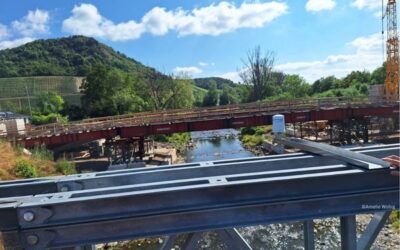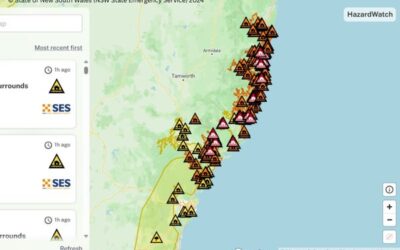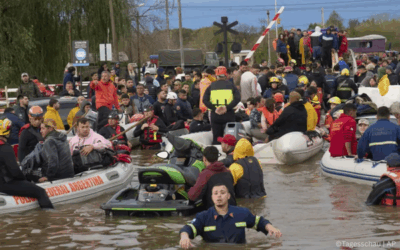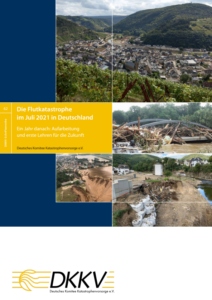Flood platform
Platform on flooding and flood events in Germany.
The effects of flood disasters are repeatedly felt in Germany and in recent decades have increasingly led to considerable damage to infrastructure, the environment and private property, as well as the loss of human life. This emphasises the need for a comprehensive understanding and effective management of flood events. Against this background, the platform offers an opportunity to discuss and exchange information on the topic of flooding in Germany.
This platform serves as a source of information for pooling data on historical and current flood events, discussing measures and networking those affected, experts and interested parties. Through a combination of scientific publications, news updates and practical recommendations for action, the platform contributes to strengthening society’s resilience to flood disasters and flooding, promoting the exchange of knowledge and avoiding duplication of research. Here you can find general information from the DKKV on flood disasters, including the issue of the DKKV publication series published in this context, as well as the flood distribution list and research activities.
DKKV Report and General Information
Flood Distribution List
Current research activities
Publications
Current Information
current Information on flood Events
4th commemoration day of the Ahr flood July 7, 2025
On July 3 and 4, 2025, events were held at the RheinAhrCampus Remagen to commemorate the 4th anniversary of the flood disaster in the Ahr Valley. Under the title “Better cooperation in the EU in crises following...
Heavy Rainfall in New South Wales, Australia Causes Severe Flooding
In recent days, torrential rainfall has affected large parts of Australia, particularly regions in New South Wales (NSW) and along the Mid North Coast. In some areas, up to 500 mm of rain fell within 24 hours, leading...
Flooding in Buenos Aires, Argentina
Unusually heavy rainfall in the Argentine province of Buenos Aires since May 16, 2025, has caused massive flooding in the agricultural region. Over the course of just three days, some areas recorded more than 400...
DKKV Report and General Information
The flood disaster in July 2021 caused damage amounting to EUR 33 billion and claimed around 190 lives across Germany – both records set in the last 60 years. As drastic as the consequences of the events are, it is equally important to come to terms with them in full openness and breadth. On this occasion, the DKKV published a new edition of the DKKV publication series, dedicated a newsletter to the topic, updated the DKKV Heavy Rain Statement and the associated topic page, and compiled victim and damage data on the 2021 flood from North Rhine-Westphalia and Rhineland-Palatinate. On this page you will find a short overview in English. For more information, please visit the German version of this page.
Issue of the DKKV publication series No. 62 "The flood disaster in July 2021 in Germany"
This edition of the DKKV publication series summarizes the causes, the course, and the consequences of the flood events. The report is in German and provides an overview of recovery activities, initial lessons to learn and recommendations for action.
You can download the entire issue of Publication Series No. 62 here. Printed copies can be ordered from the office. If you are interested, please contact info@dkkv.org.
Topic page Heavy Rain
In March 2022, the DKKV prepared some victim and damage data of the flood 2021 within the scope of the email distribution Flut2021, which was requested by the department 32 State Crisis Prevention, Crisis Management of the State Government, Critical Infrastructure Protection, Civil Defense of the Ministry of the Interior of the State of North Rhine-Westphalia. This includes information on reconstruction, death tolls or damage to structures and other infrastructure. In addition, reference is made to the interim report on the 2021 flood disaster of the Federal Ministry of the Interior and the Federal Ministry of Finance.
The preparation can be found here.
The July 2021 flood disaster in Germany in the 2022 HELP Global Report on Water and Disasters
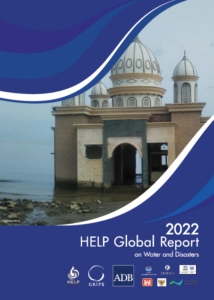
In the wake of the disaster, DKKV organized an international delegation of experts to visit the disaster area, talk to the mayor of Altenahr and discuss challenges and solutions. The delegation was initiated by the coordinator of the UN High-level Experts and Leaders Panel on Water and Disasters (HELP) and co-organized by the University of Bonn and DKKV. This resulted not only in this Flood Platform, with an overview of research on the 2021 flood and the Flood Distributor with its exchange meetings, but also in this HELP report (Kron et al. 2022), which in its translated form forms the main part of the DKKV publication series edition.
You can find the Report here.
Overarching lessons to learn from the 2021 flood disaster
A key aspect of resilience is the ability to learn, adapt and evolve. In this sense, crisis and disaster events must be worked through in order to better position oneself for future events. Following you find 12 lessons to learn with an overarching perspective. They are based on reports, analyses, workshops, and discussions and are only the first ones as may studies are still ongoing. n principle, most of the lessons compiled are not new and have been noted in similar form in the past. Nevertheless, the flood disaster illustrated how current and relevant these lessons still are.
Strenghen risk awareness and progressive risk culture
In order to be able to react appropriately in crises and assess risks with foresight, a societal perception of risk and a proactive risk culture are needed that considers not only frequently recurring but also rare, singular events. This requires strategies to talk about risks in a positive framework. In this way, open communication about potential hazards and improved risk awareness can be achieved.
Improve risk communication
In addition to risk perception, factual risk communication is a key foundation for successful crisis communication. To this end, risks must be communicated holistically, including the hazard, vulnerabilities as well as protective capacities. The role of each individual can be brought to the fore through attractive, all-society and target-group-oriented formats at, for example, city festivals or in schools.
Focus on prevention
Numerous studies show that prevention is more cost-efficient than aftercare. However, this is not only the task of politics, but must be implemented by the population itself. This includes, for example, preparing an emergency backpack, checking protective measures and insurance, and using warning apps. The focus on preparedness must continue to be linked with effective risk communication so that known measures are implemented in practice.
Better risk analyses
Due to, among other things, the lack of consideration of historical extreme events and locally higher water levels caused, for example, by the clogging of bridges, existing hazard maps partially misjudged the flood disaster. In addition to comprehensive modeling, risk analyses must also take into account particularly vulnerable groups of people and provide a basis for planning evacuations.
More room for rivers and more water storage
Runoff can be reduced, temporarily stored, and delayed by blue-green infrastructure and flood retention basins. Flood control should also give greater consideration to nature-based solutions, such as water storage in floodplains. At the same time, there should be discussion about whether residential retreat is appropriate in some areas. The expected effects of climate change must also be integrated more strongly into spatial planning.
Strenghen safety of critical infrastructure
Damage to critical infrastructures (CRITIS) – including communications networks, electricity and gas supplies, and hospitals – has made it impossible to maintain supplies to the local population. The central importance of CRITIS for societal coexistence requires better protection of these infrastructures through greater consideration in risk analyses, as well as concrete protection targets.
Rethink early warning systems
As a result of the challenges in warning the population, an improvement in warning instruments has already been initiated with cell broadcasts and the expansion of the siren network. Furthermore, the hazard situation must be communicated to various target groups in a tangible and comprehensible way and linked to instructions for action. Communication channels must be appropriate for the target group and take into account, for example, age and language.
More robust crisis communication and management
The impact of the flood disaster on individual crisis teams also affected crisis management, which, for example, limited the management of rescue operations. Difficulties can be reduced through practiced procedures, cross-organizational exercises, and the use of experienced experts. More robust communication measures improve communication between operational forces and coordination of rescue efforts.
Better coordination necessary
Operational forces and volunteers should be coordinated by trained experts. In addition to professional and volunteer responders, unattached spontaneous responders should be better integrated. The establishment of the Joint Competence Center for Civil Protection (GeKoB) has now led to greater involvement of the federal government in coordination in the event of a crisis.
Practice the emergency
To enable an effective response in the event of a disaster, disasters and evacuations must be practiced regularly with both responders and the public. These should be based on risk assessments and take into account particularly vulnerable groups and their targeted evacuation support.
Adequate materials for civil protection
A number of lessons have already been learned by operational responders in disaster management. Among other things, deficits became apparent in the equipment of operational forces. Improved equipment includes not only technical equipment but also better personal protective equipment.
Do not just rebuild but ‚Build Back Better‘
Discussions on the design of reconstruction began shortly after the flood disaster. Reconstruction should be understood as an opportunity for resilient transformation and should be designed and implemented under the aspect of “Build Back Better”. For a sustainable and resilient reconstruction, inter-communal exchange and cooperation are necessary in addition to scientific support.
Flood distribution list
Mostly in German
Do you want to stay up to date, get in touch with other researchers but also practitioners and interested people and create synergies?
For further exchange we have set up a shared (moderated) email distribution list at flut@dkkv.org, which already has over 200 members. To sign up there, feel free to contact info@dkkv.org with your contact details or sign up in the form provided.
After the first, joint online conferences, further exchange meetings are being planned. The next dates will be communicated via the flood distribution list.
Flood Mailing List
Current research activities
The events of heavy rain and flooding in July 2021 are currently being scientifically investigated by many institutions. As drastic as these events are with regard to the consequences, it is also important to process them on a broad scale. This is also a great opportunity to conduct research here in an overarching and integrative manner.
Since a lot of work such as surveys and data queries are carried out in parallel, this page offers the opportunity to compare ongoing studies on the 2021 flood disaster. Hereby, we want to achieve that synergies between research work are made possible and duplicate research can be avoided.
In particular, this concerns investigations that require data and information retrieval from external sources. Please also inform us about general research on floods. Among other things, this should help to find contact persons for comparisons of studies, to align data collections, etc. Of course, it also helps to prevent respondent fatigue in surveys, for example.
For more activities please visit the German site.


